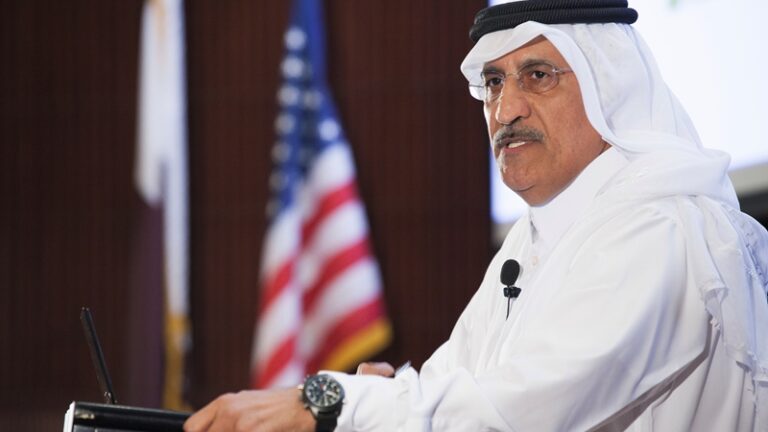Dialogue Series, Distingushed Lectures, Race & Society, Regional Studies
Sheikh Abdullah Bin Mohammed Bin Saud Al Thani on the Digital Generation

H.E. Sheikh Abdullah Bin Mohammed Bin Saud Al Thani, Chairman of the Board of Directors for Qatar Telecom (Qtel), delivered a CIRS Distinguished Lecture on “Technology and the Digital Generation” on November 7, 2012.
Al Thani began the lecture by giving an overview of Qtel and the changes it has undergone since being restructured in the year 2000. As the national telecommunications carrier, the long-term plans of Qtel were aligned with the vision that Emir Sheikh Hamad bin Khalifa Al Thani set for Qatar. “Our success starts from strong leadership and clear vision,” he said. The newly restructured organization became a competitive international player, and its scope was broadened to include data, media, and technology. Qtel was no longer a domestic telecommunications organization, but, rather, one that had an international agenda. The new Qtel strategy focused on wireless, broadband, and services in three regions across the Middle East, North Africa, the Indian Subcontinent, and Southeast Asia. The organization went from having 500,000 customers in one market to gaining 89 million customers across seventeen markets.
Current trends and rapid transformations in the global telecommunications field include slow growth, falling prices, and a multitude of new innovations, Al Thani said. Other threats come in the form of fierce competition from non-traditional competitors such as media players, retailers, service providers, and handset manufacturers who are all claiming their stake in the new media field. However, Al Thani saw these challenges as a way to form new opportunities. He argued that “by the year 2014, the number of mobile connections will surpass the global population. Four out of five connections are made in the developing world.” Al Thani argued that Qtel can thus be in the forefront of helping to provide enhanced education, healthcare, and economic services to these growing technology users.
Moving from global challenges to regional concerns, Al Thani outlined how new media and technology have impacted the Arab world. He argued that social media access was one of the key driving forces behind the events of the Arab uprisings in 2011. “From January to March 2011, the usage of Facebook increased by more than 30% across the whole of the Middle East,” Al Thani said. The internet and mobile technology was so critical to the fuelling of these social movements that the governments of Egypt, Libya, and Syria attempted to block all forms of access to internet technologies. “Digital technology is increasing the expectation of transparency and accountability from government bodies and officials,” he said.
Al Thani identified this new technologically-literate demographic as the “Arab Digital Generation,” or ADG, who have grown to represent 4% of the digitally active globally. He described this contingent as being politically active, educated, independent, and business-minded. These youth, he said, will have a significant impact on the future of the Arab World. He cautioned, however, that “while the ADG will fundamentally change Arab society, it will do so keeping our rich traditions and values intact.”
Because “social media has become a powerful tool for social change in the Arab states,” a serious challenge that Al Thani identified as affecting global and regional societies is the issue of the gender gap in relation to the use of, and access to, new technologies. “There are 46 million Arab users on Facebook. Of this group, 70% are between 15-29 years old, and the majority is male.” He identified the reasons for this gender gap as “social and cultural constraints on women, privacy and security concerns, access to technology, and education and ICT literacy.” Through its global operations, Qtel has backed new media as the primary tool of social empowerment and is attempting to narrow the gender gap by providing special services that help women to gain better access to education, small business management, healthcare, and childcare services. Al Thani said that “providing women with access to ICT tools such as mobile phones can lead to a better quality of life and wider economic growth. Empowering more women with more phones can accelerate social and economic development.”
In conclusion, Al Thani argued that despite the new challenges presented by the changing telecommunications space, “as business leaders, citizens, students, governments, and institutions, we all need to rise to the occasion and use our influence to inspire, engage, and create opportunities for the next generation. Overall, leaders in the Arab world should view these changes as positive.” As a final thought, he said that the Arab Digital generation should become empowered through communication and technology to help shape the future of industry and society in order to ensure the stability of the Arab world.
H.E. Sheikh Abdullah Bin Mohammad Bin Saud Al Thani has been the Chairman of the Board of Directors for Qatar Telecom (Qtel) and Qtel Group since 2000. In his capacity as Chairman, His Excellency enjoys State Minister status. He has presided over Qtel’s expansion into 17 countries and has enhanced Qtel’s revenue streams and its corporate governance in line with international practices.
Sheikh Abdullah previously held several high profile positions in Qatar, including Chief of the Royal Court (Amiri Diwan) from 2000 to 2005. He also served as a Member of the Qatari Planning Council. A certified pilot instructor from the British Royal Air Force, Sheikh Abdullah has an extensive background in both the military and in aviation. A flight school graduate from the British Army Air Corps, he completed his studies at the Senior Army War College, Carlisle Barracks in the United States of America.
Article by Suzi Mirgani, Manager and Editor for CIRS Publications